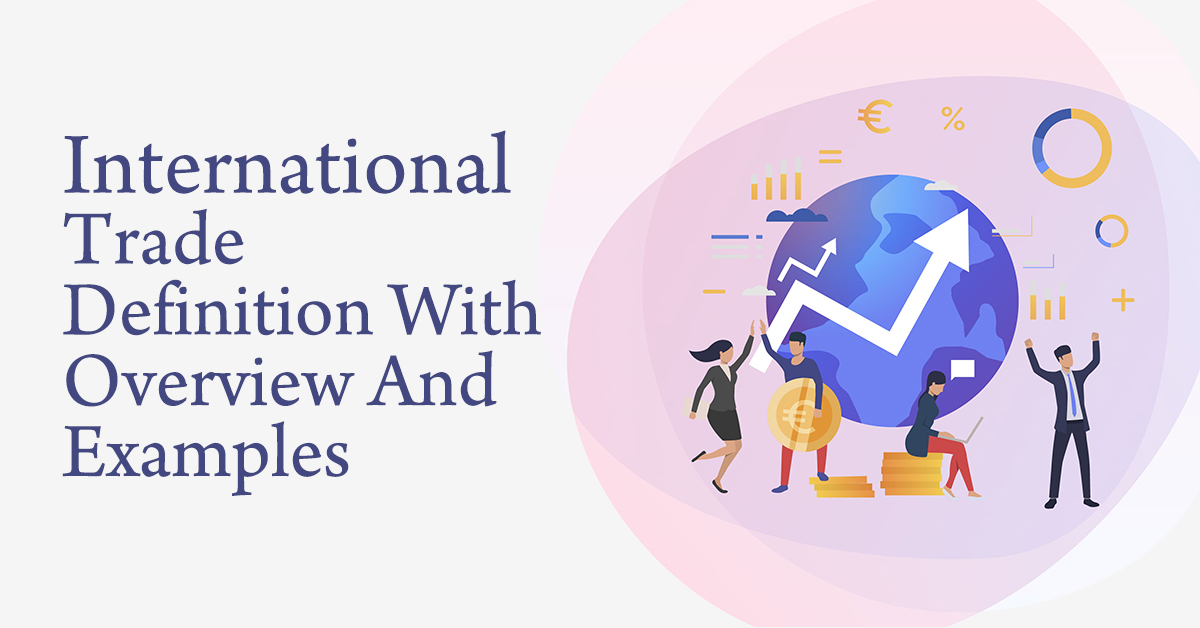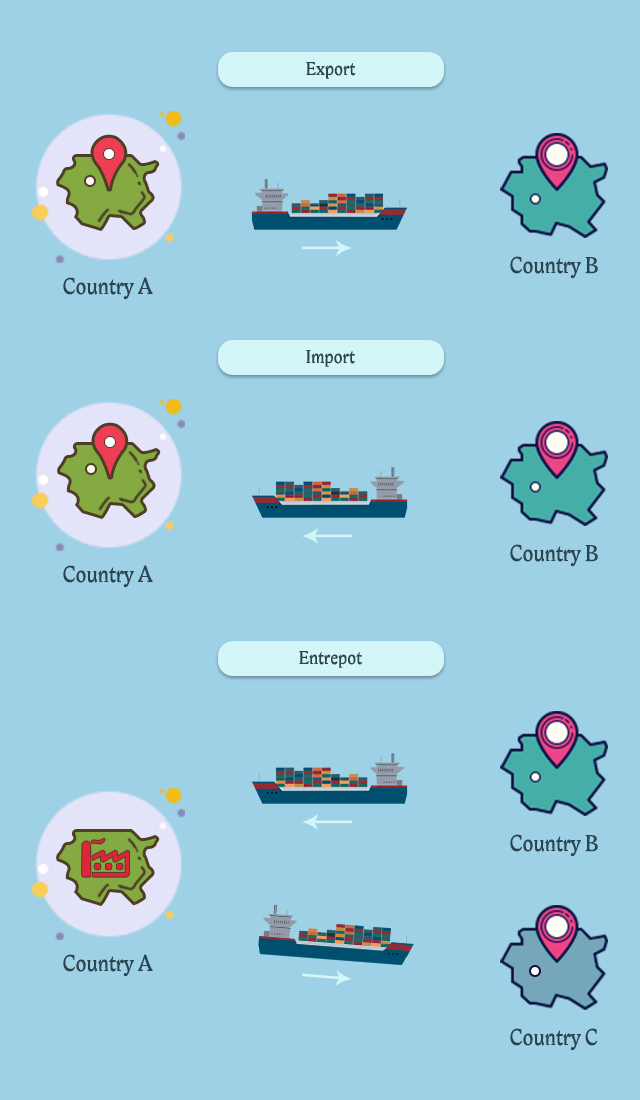International Trade: Definition With Overview And Examples
International trade
The licensed exchange of goods and services across the borders is called international trade. It establishes economic links between different nations and involves the trading of consumer goods like clothing, automobiles, electronic appliances, and capital goods like machinery, and raw materials.

Trade is an ancient practice having traces in the history of this world that involved barter of goods in the old times and now occurs with modern financial banking systems.
International trade is facilitated by the central banks and private banking systems of involved nations and promotes better standards of living. The practice of international trade is an organized process and works according to governmental policies and various international trade agreements.
International trade involves 3 different kinds of trade import, export, and entrepot.
Understand these terms with examples of international trade using labels country A, country B, and country C.
Export
When country A supplies goods or commodities to country B involving transaction of money in exchange, it is said that goods are being exported by country A to country B.
Import
When goods are being bought by country A from country B, we refer to that as goods are being imported to country A from country B.
Entrepot
It is necessary to understand the terms mentioned above to know about this third kind of trade.
When goods are bought by country A from country B, but instead of using those goods in their own country, country A processes the purchased goods and, after adding value to it, exports the processed goods to country C, we term it as entrepot trade.

Consider a real example of an entrepot kind of trade, India buys rubber from Thailand and, after processing it, exports it to countries like Japan.
Concluding the definition, in short, entrepot trade includes both import and export and involves three different countries.
Singapore is known as a key performer in the entrepot kind of trade.
The need for international trade
International trade has made it possible for the world to utilize the resources in a much proportional manner and has established economic relations between different countries.
It is necessary to lift up all the barriers and promote international trade so that no country stays deprived of any resources. It has a shortage of and citizens of every country can enjoy better standards in life.
For example, countries in middle-east have an abundance of oil reservoirs and are counted among the leading exporters of oil in the world. These countries export crude oil to oil deficit nations so they can meet their oil demands, and this way, international trade promotes the efficient flow of demand and supply chain.
Different countries function on different operational costs depending on the availability of various resources, and thus cost of availing goods and services differs depending on the place of production.
In the case where country A has less production costs than others due to factors like technology, geography, and availability of raw materials, international trade allows people of country B and C to enjoy affordable goods by importing the same from country A.
Looking at it from a different perspective, international trade generates more employment opportunities, thereby raising the overall standards of societies of both the nations involved. This is the reason why trading giants like the US and Japan have a lower unemployment ratio.
International trade plays a vital role in contributing to any country’s GDP, and a rise in trade has positive impacts on the growth of the GDP of the trading nations.
Now, after knowing the benefits of international trade, let us now scroll down to make ourselves more aware of how international trade is measured for any nation.
There are two well-known methods for measuring or calculating international trade, which are –
Balance of trade
In this method, the total value of products imported by a nation is subtracted from the total value of products exported by the same.
Balance of payments
This method is based on the number of payments done or received by a nation. The balance of payments of any country is calculated as the total sum of payments received by it minus the total sum payments it makes to other countries.
Both of the above methods involve the calculation of data collected over a certain period of time.
Know which goods are traded the most across the borders
A significant amount of goods are traded every day in large cargo ship containers to reach the global market. From unique selling goods to heavy, bulky commodities, there could be no end to the list of goods that are traded internationally.
Refining the list, take a look at 3 of the most actively traded goods internationally –
Cars
Finished cars and automobiles are the most popularly traded goods across the globe, and the total value of the trade sums up to 1.35 trillion dollars.
Germany ranks first in terms of exporting cars while the United States imports the maximum number of vehicles.
Oil
Termed to be the most valuable resource in the world, oil is always in demand and ranks second in the list of most traded commodities.
With a volume of trading 11.8 million barrels every day, Saudi Arabia is at the top of the list of oil exporters, while China is the biggest consumer of oil and imports the highest volume of oil in the world.
Download Book Now

Integrated circuits
With a wide range of applications, integrated circuits are also among the top traded goods globally.
Hongkong is the top exporter of integrated circuits in the world, while China imports the highest quantity of integrated circuits.
Enabling the customers to enjoy a wider variety of products, international trade has grown substantially in the past and is linked with the country’s economic growth as imports and exports now have a more significant share in the GDP of a country.
Talking about international trade, free trade is also a term that requires attention.
Free trade
It is a policy by which a government promises no discrimination to imports and does not interfere with exports by using tariffs or subsidies.
Such an area with no trade restrictions due to tariffs or quotas is called free trade area.
But alongside, there are some growing concerns that arose due to free trade and which need to be taken into consideration to assist the world with a better trading experience. Problems arising with free trade are –
- Displacement effects
- Infant industry argument
- Cultural homogenization
Summing it up:
International trade has worked to make the global market barrier-free and ensures to give every nation, equal rights in getting the benefit of all the natural resources. As every nation strives to achieve economic stability, international trade has turned out to be the most important contributor to the GDP and apart from the wide spectrum of benefits, it has brought the nations closer, which therefore resulted in stronger relations between them that will definitely boost their over-all economic development.
Popular Post Like This
